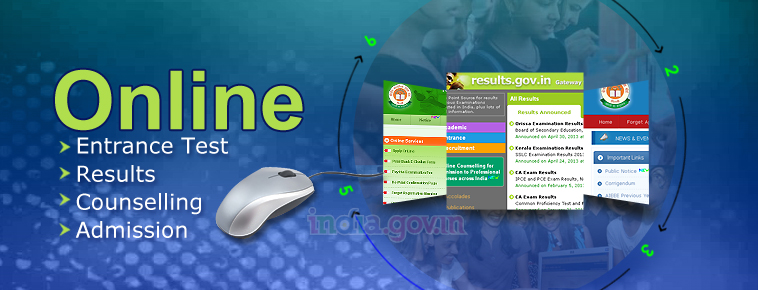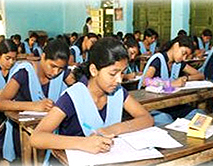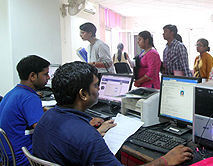
Education plays an important role in the Human Resource Development and a remedial role in balancing the socio-economic fabric of the Country. Since citizens of India are its most valuable resource, our billion plus strong nation needs the nurture and care in the form of basic education to achieve a better quality of life. For India to emerge as a knowledge super power of the world in the shortest possible time it is imperative to convert our demographic advantage into knowledge powerhouse by nurturing and honing our working population into knowledge or knowledge enabled working population.
The examination season in India generally begins in the month of March, with the commencement of school and board examinations. It is followed by various competitive examinations for specialized professional streams and admission to higher learning institutions. Other examinations, like those for recruitment, take place as per individual schedules. Post examinations follow results, which consequently make way for the process of counselling and admissions.
With the enhancement of Information and Communication Technology (ICT), all the procedures are just a click away. The initiatives undertaken by the Government help students, parents and teachers to make the system easily accessible and transparent. The availability of online entrance forms, online results, online gateways to pay admission fees, online counselling channels and e-admission processes are helping students to choose the best for them.

The Entrance examinations for various professional and traditional Undergraduate and Post Graduate courses are generally scheduled during the month of April, May and June. Among the Undergraduate courses the Pre-Engineering and Pre-Medical entrances are the most popular ones.
From the current year admission to undergraduate Engineering Programmes at NITs, IIITs, centrally funded technical institutions, institutions funded by several participating State Governments, and several other institutions shall involve in the Joint Entrance Examination, JEE (Main). The JEE (Main) will also be an eligibility test for the JEE (Advanced), which the candidate has to take if he/she is aspiring for getting admission in the undergraduate programmes offered by the IITs.
Since the year 2010, the Medical Council of India with the approval of the Central Government amended the regulations on Graduate Medical Education 1997 and made provision for a Single Eligibility cum Entrance Examination, namely, National Eligibility Cum Entrance Test (NEET) for admission to MBBS Course in each academic year. Similarly, the Dental Council of India also amended the BDS Course Regulations 2007 and notified in the Gazette of India Extraordinary dated 31st May, 2012 that admission to BDS Course in each academic year shall be through the National Eligibility Cum Entrance Test (NEET).
The entrance for undergraduate and post-graduate courses related to the Management (CAT), Fashion (NIFT), Hotel Management and Catering Technology, Law (CLAT), etc. are also popular among the students.
Online Results
Result is one of the most awaited milestones by students as it awards them for their hard work and efforts put in the whole year. There was a time when students had to queue up for hours or elbow their way through enormous crowds to catch a glimpse of examination results on the diminutive school and college notice boards. In the days gone by, long queues, incomplete information and huge travel costs were the major pain points on way to charting an ideal career path. But today, the Indian education system has taken a digital leap with the help of the effective use of the internet.
Now students can access results with minimal efforts and time. To make the results readily accessible to every nook and corner of the country, the National Informatics Centre(NIC) has been disseminating results using multiple channels since 1997. Besides the internet, the results are also being made available through the Interactive Voice Response System (IVRS), Email and SMS (Short Message Service).
A specialized portal (http://results.gov.in) is not only a single-point source for results of various examinations conducted in India, but it also facilitates access to other relevant websites, besides helping students and their guardians download mark sheets and various admission forms. Important announcements for students are posted on the portal before and after declaration of the results. The site basically offers the following type of results:
- Results of Board/Academic Examinations: These are results of Board Examinations that are conducted by the Central Board of Secondary Education (CBSE) and various State Boards for students of Classes X and XII.
- Results of Entrance Examinations by Universities for UG/PG Courses: These refer to the results of examinations conducted by the major Central and State universities.
- Results of Entrance Examinations for Admission to Professional Courses: The results of National Eligibility Cum Entrance Test (NEET) for Pre-Medical/Pre-Dental Entrance Examination, Engineering Entrance Examination Joint Entrance Examination, JEE (Main) and JEE (Advanced) for admission to Indian Institutes of Technology, etc. are available in the section. Announcement for upcoming entrance test results are also provided.
- Results of Examinations for Recruitment: Vacancies for employment are keenly competed for, and to bring about a smoother transition between the demand and the supply of work opportunities, various agencies carry out recruitment drives to services and posts under the Union Government through a strict selection process with the help of competitive examinations and interviews.
Important Links for online examination results
- CBSE results
- Result Portal
- National Eligibility Cum Entrance Test (NEET)
- Joint Entrance Examination, JEE (Main)
- JEE (Advanced) for Indian Institute of Technology
- National Defence Academy

It is often seen that the students have to face difficulties while selecting their courses, colleges and universities. While various Boards, Institutes and Universities make their application forms, brochures, and dates, etc. available on their websites, parents are on tenterhooks nevertheless. Often students are shortlisted for various general and professional courses as per their performance in the entrance tests. There are instances when one student is selected for more than one courses while another fails to make it to even one.
The specialized portal http://results.gov.in has a specialized page on the Online Counselling.
The Central Counselling Board, supported by the Ministry of Human Resources Development conducts counselling during the first half July every year. The CCB counselling sessions are held with the help of the Central Board of Secondary Education (CBSE), the National Informatics Centre (NIC) and participating institutions like the National Institute of Technology (NITs), the Indian Institutes of Technology (IITs), deemed universities etc.
Several state organizations are also conducting online counselling for their respective state colleges.
Important Links for Counselling
Season of Admission
There can be different sets of requirements depending on the type of education you are planning to pursue in India. Admission rules and criteria can differ from one institution to another. Admission details are mainly provided in the brochures along with the form by schools, colleges and private institutions. Each course requires different eligibility criterion for students. These days most of the professional courses first require students to take competitive examinations while some institutions accept admissions only on the basis of merit. For the Foreign Nationals/Persons of Indian Origin (PIOs)/Non-Resident Indians (NRIs), the Ministry of Human Resource Development has Direct Admission of Students Abroad (DASA) programme.
The Central and State Universities, colleges and institutions all make use of the online mode through their individual web portals in order to make sure that interested students stay in the knowhow of the admission procedure. Similarly, institutes following the Open and Distance Learning (ODL) system also have facilities for submission of admission forms and choose various distant learning courses online.







